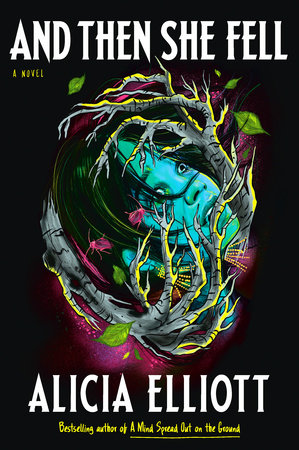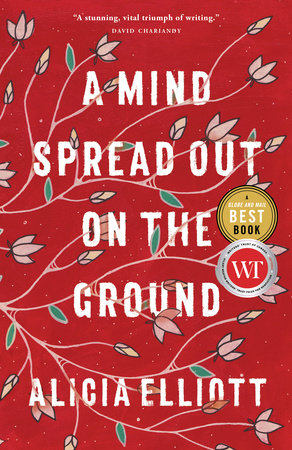Full story text pasted below, as well as on the A&S News website.
Award-winning Indigenous author, Alicia Elliott, spoke to a group of A&S undergraduates about the craft of writing and the journey to becoming a writer.
Elliott, an award-winning Tuscarora writer of Six Nations of the Grand River who lives in Brantford Ontario, has had numerous essays nominated for National Magazine Awards, winning a gold medal in 2017 and an honorable mention in 2020.
Her first book, A Mind Spread Out on the Ground, was a national bestseller in Canada. It was also nominated for the Hilary Weston Writers' Trust Prize for Nonfiction. She is currently promoting her latest novel, And Then She Fell.
A graduate of York University’s creative writing program, Elliott spoke candidly to Jessica Johnson’s third-year Literary Journalism class in the Department of English last month about her path to publication.

“Alicia has exactly the career I want you to learn from,” said Johnson, a former editor-in-chief of The Walrus, referring to Elliott’s rise to national recognition in less than a decade. “This doesn’t happen for everyone, but it happens for some.”
Elliott told the class about how it was just a few years ago that she was working at Starbucks, raising her young son and sending off submissions to literary magazines and other publications across Canada, hoping for a response.
She explained that as an aspiring writer, she read with purpose, wanting to fully understand the structure of good writing and compelling stories. She sought to break down stories and books to understand just what made a story engaging.
“I was going back to each work saying, ‘How did they put this together? What did they put first? What did they put second? How did they create tension?’” she said. “I was literally taking them apart scientifically.”
She also spoke of writers who inspired her, such as Joan Didion and her book The Year of Magical Thinking that chronicles Didion’s experiences of grieving after her husband’s death and daughter’s serious illness.
“Her creative nonfiction is some of the best writing you will read,” said Elliott. “That book blew my brain because it talks about her personal tragedy. With everything she was doing, I thought, ‘What the hell? I didn't know you could even do this.’ It really opened me up.”
She also recommended reading the American writer and civil rights activist, James Baldwin, praising him as a master of structure.
“He really thinks about ‘Where am I going to start this? Where am I going to end this? How am I going to get there?’ If you want to write novels, read his novels. If you want to write essays, read his essays. If you want to write nonfiction, read his nonfiction books.”
In Elliott’s nonfiction writing, she tackles sensitive issues such as race, parenthood, love, mental illness, poverty, sexual assault and gentrification. Regardless of the issue, she tries to present passionate arguments by balancing emotions such as anger, frustration or outrage, with solid research as well as efforts to connect with the reader.
In fact, she considers the reader’s experience from the very beginning.

“I don't necessarily write for myself, I'm writing with the anticipation that someone else is going to read it,” she said. “What I try to do before I start writing, is to decide who I want, what type of person, or what group of people I want to feel most understood in that piece. That's what guides me.”
She examines her arguments to such an extent that she often considers, and sometimes acknowledges, counterarguments.
“Sometimes people will think, why would you want to bring in any acknowledgment that the idea you're bringing forward is not the right idea? To that I say, if you think you have the right idea, you're doing something wrong, because I don't think anyone has the perfect solution for any of these things.
“And if we feed into that, then we're lying to the people we're talking to. We're also doing a disservice to the communities we're writing about, and the people who are going to be reading it.”
Elliott admitted that examining arguments from multiple angles can be arduous, but the finished story, essay or book is worth it.
“I think so much about every aspect of it, that it can seem overwhelming, and it certainly feels overwhelming sometimes,” she said. “But when it's published, I know exactly why I made each decision I made as opposed to someone asking, ‘Why did you do this?” And me saying, ‘I don't really know.’ I do know because I put so much conscious decision-making into how I did it.”
Students also asked Elliott about finding their voice and overcoming feelings of self-doubt when writing.
“Remind yourself that every writer that you respect, and it doesn't matter if they’ve won Pulitzers or Academy Awards — when they’re sitting in the chair and staring down at a blank page — they’re feeling the same insecurity as you every single time,” she said. “That doesn't go away. I'm not trying to discourage you, but this is a normal part of writing.”
She also noted that she can spot potentially talented writers through their reluctance.
“I often find that people who are the most hesitant to call themselves writers are the most careful writers because they care about how they're putting pieces together, how they're representing things, and the responsibility that goes with that.
“It's funny, and this is especially true with young writers — if you ask them, ‘Are you a writer?’ They'll say, ‘Oh well…’ and as soon as I hear that hesitation, I think, ‘Yeah, you're a writer.’”


